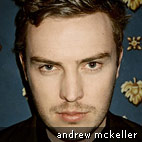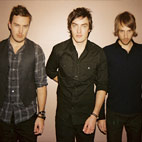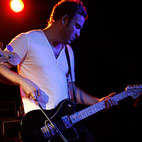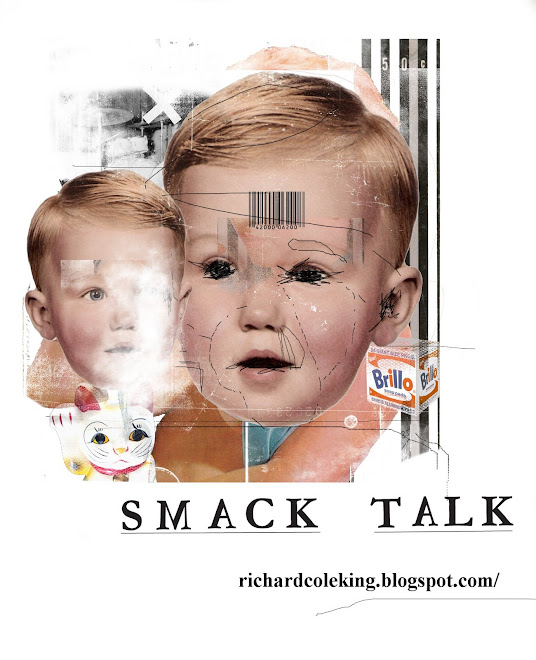
Civil Twilight released their debut album Human in 2007. They were lucky enough to be picked up by a TV and Film placement company based in Los Angeles who placed a few of their songs in prominent television shows and major films. Wind-Up Records liked what they heard. They signed Civil Twilight and released the band’s self-titled sophomore release in March 2009. The band is presently on tour where guitarist Andrew McKeller was generous enough to answer some questions for Ultimate-Guitar.com.
UG: What brought the members of Civil Twilight together?
Andrew McKeller: We all grew up in the same small town in South Africa and attended school together. Rich and I were in the same grade and one day decided to start jamming together. We later brought my younger brother Steve to practice and he eventually became the singer and bass player. I'm grateful for those early series of events. We would be no where if we didn't have Steve on board. I guess it's a small mystery why we are still together. We respect each-other, which helps and we have all shared a lot of challenging times. Moving to the States with nothing and having to survive, we all lived in a hot sweaty garage and shared a car for years. We even shared a cell-phone for almost a year. Through all that you learn another level of respect.
Who came up with the name of the band?
The name came from a list of aviation terms we had been looking through. We were a little inspired by the band name Wilco, also an aviation term. Out of all the names we were looking through, Civil Twilight seemed to stick out. Its definition is a certain time of twilight when only the brightest stars are visible. I don't think any of us really have a strong connection to the name. We just liked it and decided to use it.

"I guess it's a small mystery why we are still together."
Bands like Oasis, Silverchair, Reef etc. were mine and Steve’s first introduction to music that made me want to listen and hear more and ultimately made me want to play guitar. As a young teenager I related very quickly to the angst and attitude in the music. I couldn't give a shit what they were saying but I could feel the passion and I wanted to somehow create that. Music is a very emotional medium for me. The very fact that just the sound of a guitar can make you want to break something or make you cry is still incredible to me. Bands like Rage Against The Machine or more specifically Tom Morello or Jack White can create music that gives you a sense of power and invulnerability just from the notes they choose to play. Or someone like Jeff Buckley who can make you feel his desperation and sensitivity by what he plays. I think I've always been attracted to music that stirs me and the mystery of it.
What was it like growing up in Cape Town, South Africa?
Cape Town is a very beautiful place with a very diverse culture. White sandy beaches and mountains surround the city and we spent most of our time outside. As many people know, South Africa has had a very shameful history of segregation. We were lucky enough to have great parents who were against what was happening at the time. Our perspective growing up was that of equality and respect for all people. South Africa has an incredible mix of people, and therefore music, and we all grew an appreciation for that. South African bands like Johnny Clegg and Ladysmith Black Mambazo were great. And the jazz scene too had a very unique flavor which I still enjoy. Elements of all that can be heard on more commercial albums like Paul Simons [record] Graceland, which included some South African musicians. I have a great appreciation for different cultures and what they all bring to society.
I feel very privileged to have grown up there.
What was the impetus for making your first record Human? Where did those songs come from, and what made you feel ready to release them to the public?
Well, we recorded that album pretty quick and it was a reflection of what we felt at the time. We had been writing a lot and went into the studio and pretty much played everything live. Songs like “Human” were done completely live with no overdubs. Once it was all done we didn't really think there was much of an option but to release it. And at the time we were still unsigned and wanted something we could tour with and sell. We got the interest of a TV and film placement company in LA who got us placements on “House,” “Without A Trace” and the new “Terminator” series. And eventually the interest of Wind-Up Records who signed us in mid 2008.
How did the music industry respond to Human?
The only real avenue we had to sell the record was at shows, and we set up an online store where you could buy the record for $5 or download it for free if you wanted to. We just wanted to get our music our there and thought if it was available for free, people who didn't want to spend the $5 could just get it. We encouraged everyone to buy it if they liked it. As far as the industry goes, we had a few reviews online and in magazines but our biggest response has been from the TV/Film industry. They gave us a chance to be in front of a lot of people and we gained a few new fans from that.
How did you meet David Kosten and what was it like working with him on your self-titled recording released earlier in 2009?
David was great. We had such a relaxed, fun time working with him. He had some great ideas and pushed us a bit to think outside of the box. We were given a list of producers from Wind-Up and really liked what he was doing. The Bat For Lashes stuff was great as well as his own stuff under Faultline. So it was a no brainer when we had to choose. I hope we get to work with him again in the future.

"Its definition is a certain time of twilight when only the brightest stars are visible."
This song was written in the studio. I remember hearing Steve playing a riff on the piano and I really liked it, so we all got into the live room and started playing with him. We jammed it out a couple times and it all came together pretty quick. There was a vibe there already and we just reinforced it. It's a love story about a man in a prison camp who is dreaming of being free and seeing his loved one again. We didn't think too hard about this, but the dynamics of the music seemed to fit perfectly with the story.
What elements do you look for in you songs? What do you listen for when you are developing the songs?
The process was very natural. We would jam for hours on end and listen back to elements we liked and construct songs from those. At the time there wasn't much of a conscience effort to have a theme or particular mood for the album. Once listening back to what we were working on we tried to make sure that the songs had an emotion to them. A song like “Human” was written by Steve while we were in South Africa visiting the family. When he played it to us in the studio one day we knew right away that we had to record it and put it on the album. It spoke to all of us and continues to speak to me.
UG: What is next for Civil Twilight?
That’s a good question. Well, we are touring right not and will continue to do that for a while. It has been very exciting traveling around America and playing. We are continuing to write new material and be inspired by what we hear and do. Trying to be a better band is one of the next steps, I guess. The music industry is a very different place these days, so we are always trying to think of new ways of making this band a success, whatever that means. But success for us, I think, is more about getting to do what we love, being creative and making music we are proud of.
Click here for more on Civil Twilight.
.jpg)



No comments:
Post a Comment